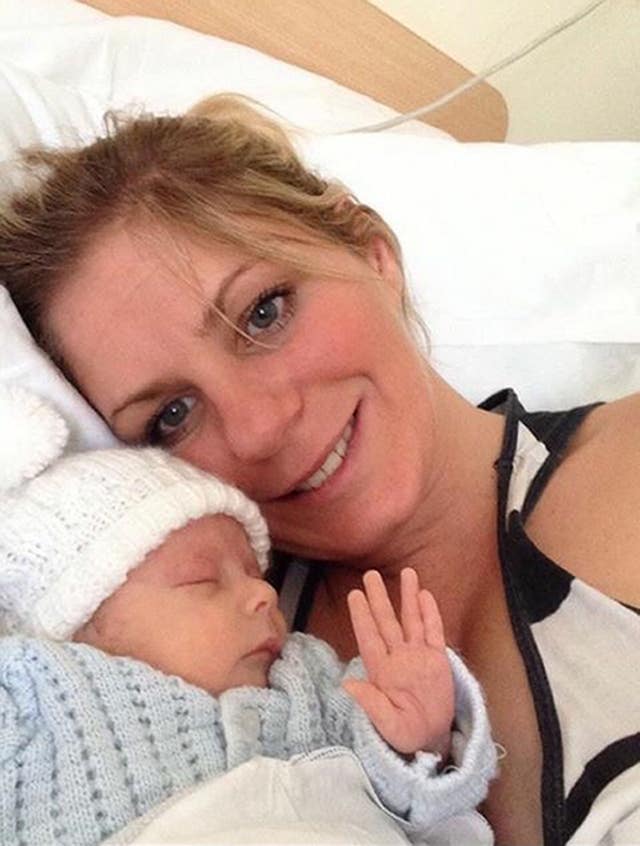Doctor defends decision not to give antibiotics to baby before death
Ben Condon, who was two months old, died at Bristol Children’s Hospital in April 2015 after developing a respiratory illness.

A doctor treating a premature baby has defended the decision not to administer him with antibiotics the day before he died, an inquest heard.
Ben Condon, who was two months old, died at Bristol Children’s Hospital in April 2015 after developing a respiratory illness.
Dr Suzy Dean was treating Ben at the hospital’s paediatric intensive care unit for acute respiratory distress syndrome (ARDS) and metapneumovirus (hMPV) – similar to the common cold in adults.
She said that although Ben was being ventilated and was unwell, his condition was stable.

Avon Coroner’s Court heard that the following day, April 17, Ben’s condition deteriorated, and he suffered two cardiac arrests before passing away.
It later emerged that before his death Ben had also developed a pseudomonas bacterial infection.
The University Hospitals Bristol and Weston NHS Foundation Trust, which runs the children’s hospital, admitted their failure to give Ben timely antibiotics contributed to his death.
Dr Dean told the inquest that doctors always recognised there was a risk of a baby developing a bacterial infection, but Ben’s presentation on April 16 was stable.
Assistant Coroner Robert Sowersby asked whether there was a “missed opportunity” not to test Ben’s blood for a bacterial infection on any day between April 12 and 16.
“I find that difficult because looking back on what we know now, I know there was an infection which was unexpected, but I don’t believe he showed signs of an infection on April 16,” Dr Dean replied.
“I think it would have been nice to have an extra set of bloods to reassure me.
“I am not saying Ben is fine, because he has gone ARDS, he has got significant ventilation requirements, and he is very much in an ICU setting.
“But there wasn’t a paradigm shift in how he was presenting.”
Dr Dean explained that Ben’s body temperature was fluctuating, but that alone was not an indicator of an infection.
“To be honest. it didn’t particularly concern me, rightly or wrongly, and I appreciate the family have a strong view on that,” she told the hearing.
“It is one factor in his care. That in itself doesn’t tell me that he is developing an infection.”

Dr Dean was quizzed on other signs of infection in a baby, such as rising C-reactive protein levels in the blood and the “end of bed” observations.
Ben’s father, Allyn Condon, a former Olympic athlete, has told the inquest that his son was visibly deteriorating in front of him between April 14 and 16.
Jennifer MacLeod, representing the Condon family, asked Dr Dean: “That’s another indication that his infection is getting worse?”
The witness replied: “Yes it would be, but the difficulty is that I didn’t share that view that he was changing that significantly from the end of the bed.
“We had fluctuations in the amount of fluid he was carrying, and you can see slightly puffy eyes and there were a few periods where the diuretics were increased just to try and manage that.
“It’s what’s expected and not expected in terms of his colour, how he handles and responds to being touched and moved.
“How does to look to me? Is he warm? Is he cold? That’s the sort of subtlety you only get by touching and that is difficult to get across in the notes.
“I didn’t feel he was changing.”
Ms MacLeod suggested Ben was getting worse the day before he died because of a bacterial infection.
“I don’t agree with that. There are other markers that we have not talked about as well,” Dr Dean said.
“Two other consultants examined him on the afternoon of April 16 and neither of them felt anything else needed to be changed, it’s not just my view on that day.
“He didn’t look unwell from the end of the bed, and I appreciate his family feel otherwise. That was just my view at the time.
“The thing about paediatric intensive care is that Ben was actually quite a stable patient in that he wasn’t doing anything that I didn’t expect.
“Yes, we he had ARDS, and yes, his ventilation was getting worse, not better. But he was stable around that.
“Someone of Ben’s age is not going to look stable if they have got sepsis, it just doesn’t look like that.
“Regardless of what I saw and thought, I did have two other colleagues look at him that day. Three of us were not concerned that we needed to escalate his treatment.”
Dr Dean told the court she had reflected on whether the antibiotics should have been administered sooner.
“I know what I did on that day is different to what some of the experts have suggested, for example,” she said.
“But I think, and I know I keep saying that every child is at risk of secondary infection, but if we treated every child that had a change of x-ray and the changes we saw in Ben with antibiotics, then we would be treating with antibiotics all the time and that’s just not the right thing to do.
“We have rely on what we are seeing and if things change, reassess.
“You cannot put someone on antibiotics because there is a risk of it, because every child is at risk of it.”
The inquest continues.





